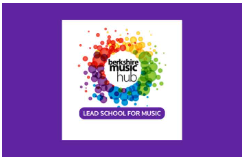Music at Garland
Music
Statement of Curriculum Intent for Music
At BCF we believe that music is a powerful tool for learning, expression and change. It is a form of communication that entertains, expresses thoughts and feelings, and significantly benefits social, emotional and health development. Its contributions to wider intelligence and achievement are well researched and proven. It is a strongly held belief by staff and children at the school that music education is for all and we believe that each child possesses musical ability. We view music as a force that impacts every aspect of our lives, regardless of our circumstances.
As the children progress through school, they learn how music can reflect and shape our views of culture, creativity and how it can represent our history, and personal memories, and be excited about how it can develop into our future. They can listen and enjoy, they can play, and they can create throughout their time learning.
Every child is a musician, and every child can learn and respond to music as it is a universal language.
Through our music curriculum we aim to:
- Enable every child to become better musicians
- Develop a passion and curiosity for music
- Create units of work that cover the National Curriculum programmes of study
- Develop pupil knowledge, skills and understanding through sessions that include playing, singing, performing, composing, listening and responding
- Enrich and support work in other areas of the curriculum through cross curricular teaching
- Promote our pupils' emotional, social, spiritual and cultural development through music.
Curriculum Implementation
In EYFS and KS1, music and song are used in daily teaching in a cross-curricular manner, weekly singing assemblies, and subject specific lessons taught by a specialist. Later, the children are invited to join the school choir.
As they move through the schools we provide opportunities for all children to create, play, perform and enjoy music, to develop the skills, to appreciate a wide variety of musical forms, and to begin to make judgements about the quality of music.
All our pupils will be given opportunities to:
- Develop musically at a pace that is appropriate for them as a learner
- Communicate their ideas and feelings about music through movement, musical vocabulary and the expressive arts
- Listen and respond to a wide range of live and recorded music
- Explore musical ideas through composition
- Learn about the musical elements of pitch, duration, dynamics, tempo, texture, timbre and structure
- Play tuned and untuned instruments
- Sing as a school ensemble, in class music lessons and, where relevant, in other curriculum areas
- Perform independently, as a class and in smaller ensembles to a variety of audiences
- Take part in dramatic productions that include music
- Take up playing of a musical instrument
- Participate in music-based clubs and music enrichment groups.
Curriculum Impact
The impact of our Music curriculum is evidenced in multiple ways:
- Music will help children develop a sense of belonging to the school and community
- Children will make connections in their learning, with prior learning and with cross-curricular links
- Children will experience success, no matter what their starting points
- Children will develop resilience and confidence in their musical learning
- Children will build positive relationships with others, both children and adult by learning and connecting through music.
Music Elements Progression
Music Long Term Planning
Music Partners
Pupils at Garland Junior School have the opportunity to work with our music partners, Berkshire Music Trust to learn an instrument; currently we have children learning to play guitar, clarinet, keyboards and brass with Berkshire Music Trust and guitar with Music Guru.
National Curriculum For Music







